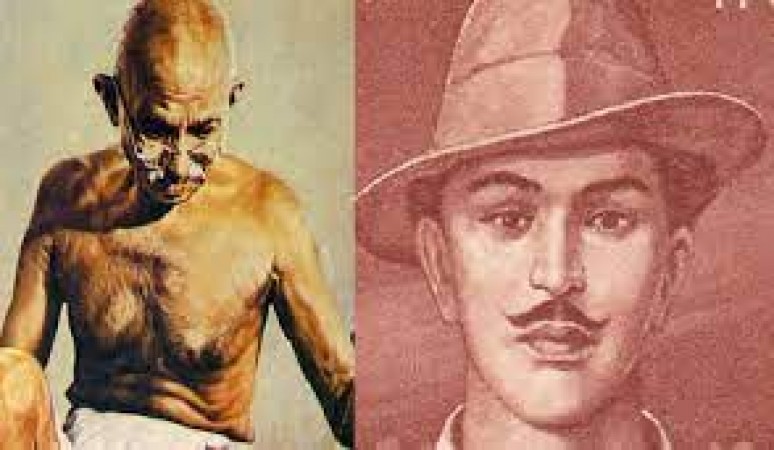
In the quest for independence from British colonial rule, two iconic figures emerged as powerful symbols of the struggle for Swaraj (self-rule) in India. Mahatma Gandhi and Bhagat Singh played pivotal roles in inspiring and leading the Indian masses against the oppressive British regime. This article delves into the lives, ideologies, and contributions of these two influential leaders who fought for the same cause but with different approaches.
Mahatma Gandhi: The Champion of Non-Violence: Mahatma Gandhi, also known as Mohandas Karamchand Gandhi, was a prominent figure in India's fight for independence. He advocated for non-violence, civil disobedience, and passive resistance as powerful means to challenge British oppression. Gandhi believed in the transformative power of Satyagraha, a philosophy that emphasized truth, non-violence, and love.
Gandhi's leadership during significant events like the Salt March and the Quit India Movement inspired millions of Indians to join the struggle for Swaraj. He emphasized the importance of self-sufficiency, communal harmony, and peaceful coexistence. His teachings and principles had a profound impact not only on India but also on other freedom movements around the world.
Bhagat Singh: The Revolutionary Martyr: Bhagat Singh, a fearless and charismatic revolutionary, believed in a more militant approach to attaining independence. He sought to dismantle the colonial structure through armed struggle and revolutionary acts. Bhagat Singh's actions were aimed at shaking the British Empire and arousing the masses from their complacency.
Singh's involvement in the Lahore Conspiracy Case and the bombing of the Central Legislative Assembly made him a symbol of resistance against British rule. Despite his young age, Bhagat Singh displayed immense courage and patriotism and a willingness to sacrifice his life for the cause of Swaraj. His passionate speeches and writings inspired a generation of freedom fighters.
Ideological Differences:-
4.1 Satyagraha vs. Armed Struggle: The primary difference between Gandhi and Bhagat Singh was their approach to achieving independence. Gandhi propagated the philosophy of Satyagraha, believing that non-violent resistance would ultimately lead to the triumph of justice. On the other hand, Bhagat Singh favored armed struggle as a means to challenge British supremacy. He believed that violence was a justifiable response to extreme oppression and injustice.
4.2 Approach to Political Power: Another contrasting aspect of their ideologies was their approach to political power. Gandhi advocated for moral leadership and believed in the power of mass mobilization to bring about political change. He emphasized that the Indian National Congress, through non-violent means, should be at the forefront of governing the nation once independence is achieved.
In contrast, Bhagat Singh expressed skepticism towards conventional politics and criticized the Indian National Congress for its compromises with the British government. He argued that a truly independent India required a complete overhaul of the existing socio-political system and the establishment of a socialist state.
Their Impact on the Indian Freedom Struggle: Both Gandhi and Bhagat Singh played significant roles in galvanizing the Indian masses against British rule. Gandhi's non-violent methods appealed to a broad spectrum of society, including peasants, workers, and intellectuals. His emphasis on self-discipline, constructive work, and unity paved the way for a powerful mass movement that shook the foundations of the British Empire.
Bhagat Singh, on the other hand, became a symbol of resistance and defiance for the youth. His acts of bravery and sacrifice awakened a sense of nationalism and inspired countless individuals to actively participate in the freedom struggle. Though his methods were more radical, Singh's passion and dedication to the cause left an indelible mark on the collective consciousness of the nation.
Legacy and Historical Significance: The legacies of both Gandhi and Bhagat Singh endure to this day. Mahatma Gandhi's principles of non-violence, truth, and self-reliance continue to inspire people worldwide. His role in India's independence movement and his efforts to bridge communal divides left an indelible impact on the country's socio-political landscape.
Bhagat Singh, despite his relatively short life, became a martyr and a symbol of bravery and defiance. His struggle against imperialism and capitalism resonated with the masses, and his ideology shaped subsequent generations of revolutionaries. Singh's unwavering commitment to the cause of Swaraj cemented his place in India's freedom struggle.
Conclusion: The battle for Swaraj witnessed the convergence of two distinct approaches—Gandhi's path of non-violence and Bhagat Singh's revolutionary zeal. While Gandhi sought to awaken the conscience of the British Empire and the Indian masses through non-violent resistance, Bhagat Singh believed in the power of armed struggle to shake the very foundations of colonial rule. Both leaders, though differing in methodology, shared the ultimate goal of liberating India from British oppression.
Their contributions and sacrifices serve as a testament to the resilience and determination of the Indian people in their fight for independence. Gandhi's non-violence and Bhagat Singh's revolutionary spirit continue to inspire generations, reminding us of the unwavering resolve necessary to achieve freedom and justice.
Unveiling the Historical Journey and Impact of Indian Commercial Banks
Bangalore Metro Trials for Two New Sections to Start Next Month
Breaking Barriers: Celebrating the Remarkable Contributions of Indian Women